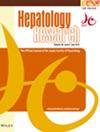Diagnostic accuracy of hepatitis E virus antibody tests: A comprehensive meta-analysis
Abstract
Aim
Hepatitis E virus (HEV) is a major global health issue, with an estimated 20 million infections annually. Although polymerase chain reaction (PCR) is the diagnostic gold standard due to its precision, it is expensive and technically demanding. Antibody tests offer a more practical and cost-effective alternative, although their accuracy can vary due to factors, such as test manufacturer, antigen composition, HEV genotype, and host immune status.
Methods
A comprehensive search was conducted in PubMed, Cochrane, Scopus, and Web of Science databases. Studies included comparing the sensitivity and specificity of immunoglobulin M or immunoglobulin G antibody tests to PCR. Exclusion criteria were non-PCR comparisons, sample sizes under 10, IgA or antigen tests, non-human samples, or missing sensitivity and specificity data. Only English-language full-texts or abstracts were considered. Data analysis was performed using Meta-DTA v2.1.1 and Stata 16.0.
Results
The meta-analysis evaluated 8054 blood samples from 21 studies. Immunoglobulin M antibody tests demonstrated an overall sensitivity of 83% (95% CI 76–88) and specificity of 98% (95% CI 97–99). Immunoglobulin G tests showed a sensitivity of 74% (95% CI 62–82) and specificity of 89% (95% CI 84–93). Among manufacturers, Wantai was the most accurate for immunoglobulin M detection, whereas MP led for immunoglobulin G. Notably, test sensitivity improved when the test protein genotype aligned with the HEV genotype.
Conclusion
This meta-analysis confirmed that antibody assays have a good sensitivity and high specificity to detect HEV infection in situations where PCR is not feasible, highlighting their potential as a practical diagnostic tool.


 求助内容:
求助内容: 应助结果提醒方式:
应助结果提醒方式:


